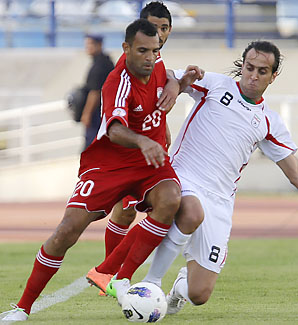Lebanon emerges in qualifying with hope for first World Cup berth
Over the last 15 months, the national team has jumped from 177 in FIFA's rankings to 124. More importantly, it's possible Lebanon could make its World Cup debut in 2014.
As Lebanon has been climbing the standings, Asian teams have been falling on the road to Brazil. There are only 10 left in the final round, divided into two groups of five, and for the first time ever, Lebanon is one of them. This is a little team that is looking like it could make it, against all the odds.
The Cedars have been placed in Group A along with South Korea, Iran, Qatar and Uzbekistan. The top two teams go to Brazil automatically, but third place offers a playoff route. That is the target of Theo Bucker, Lebanon's German-born coach.
Not only did Lebanon famously defeat South Korea in the previous round of qualification in November 2011, it then beat Iran for the first time Sept. 11. The visitors arrived in Beirut led by former Real Madrid coach and Manchester United assistant Carlos Queiroz but could not find an answer to Roda Antar's first-half header.
The win puts Lebanon fourth but level on points with Iran in second and Qatar in third. They have played four games out of the eight, one more than its rivals. "I'm very, very happy," said Bucker, a former Borussia Dortmund and FC Schalke player. "Happy about this team and what we achieved out there. I hope this shows you guys that when you do not disturb us and let us concentrate on our football you finally see what we can do."
Disturbances are part of Lebanese soccer which is, like the country, still recovering from the 15-year civil war that ended in 1990. Clubs represent the various religions that make up the nation, and the German coached one of the biggest, Al Ahed. It is a Shi'ite team, financed, at least in part, by Hezbollah. Rivals Al Ansar and Al Nejmeh are Sunni sides, and there are teams from the Christian, Druze and Armenian Catholic sections of society.
No wonder perhaps that until recently, the stadiums had been closed for five years due to crowd violence. Even now that fans are allowed back to watch their local clubs, for most games, few choose to do so.
This may be the Middle East, but there is no Saudi/UAE/Qatari-style oil money here propping up the game and attracting big-name foreigners. Unless you have a backer such as Hezbollah, it can be a serious struggle and even such groups don't invest much.
When in South Korea for a June qualifier, which Lebanon lost 3-0, Bucker told his players to enjoy the state-of-the-art facilities as well as use them for motivation -- both for the game itself and their future professional careers. A trip to Paju Football Center just north of Seoul revealed seven pristine playing surfaces just for training.
"They were like Persian carpets and we don't have one pitch as good as that in Lebanon, not even at the national stadium," Bucker said.
Players come from the poorer parts of society and some are, according to the coach who is married to a Lebanese woman, professional in name only. He doesn't care about their religious background, just whether they are talented or not. During trips overseas and training at home, the team's overseas contingent (just three or four but hugely important) are encouraged to spend as much time as possible with the local players, in the hope that professional habits rub off and ambitions are stirred.
"The big problem is being able to execute football in the way that it should be," Bucker said. "After such a long time of war and the difficult political situation, it is tough. The clubs have no money. ... The league has no money. I am the coach of the national team because I coached at the club that supplied most of the players."
Bucker has done his best to instill a club-like atmosphere with the national team, and its work ethic against Iran showed he has succeeded. Lebanon may not be able to match the Persians in terms of resources and talent, but it has spirit.
"For me the best player is the team," Bucker said. "They have collective work in society and it is the same in football. (Lionel) Messi gets all the prizes, but at the World Cup (Bastian) Schweinsteiger took him out of game. There is always a way with a system. The whole team is ambitious and we are together."
If Lebanon gets to the World Cup, the statement that the national team can do what politics and religion can't and unite the country will become cliché, but it won't make it any less true.





